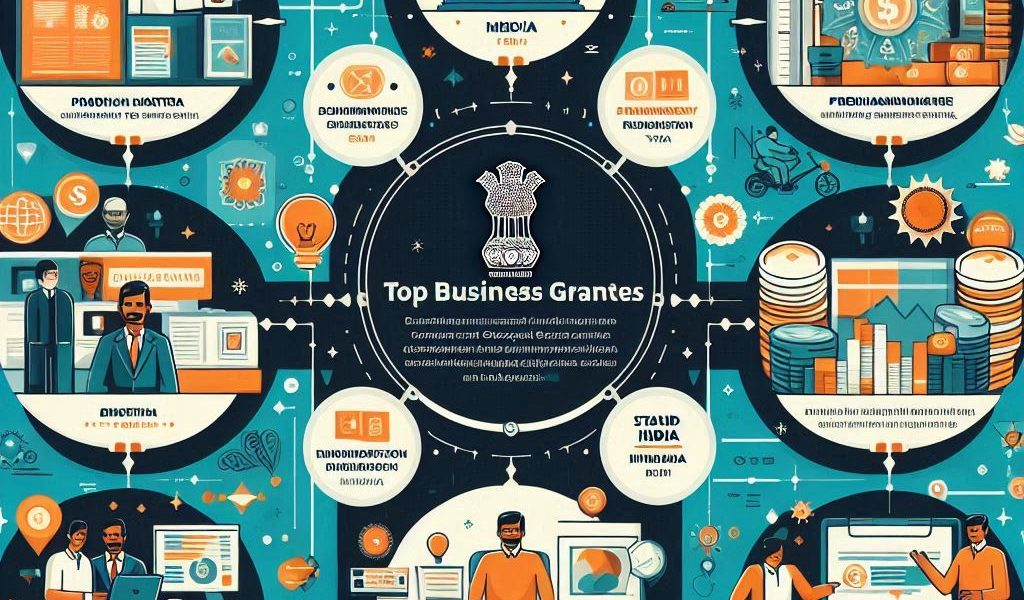In India, starting and running a business can be an exciting yet challenging endeavor. With a diverse economy, a growing population, and increasing competition, entrepreneurs need every advantage they can get. One of the most effective ways to reduce financial strain and promote growth is through government grants and subsidies. These grants help businesses thrive by providing financial support, reducing operational costs, and encouraging innovation.
If you’re considering starting a business in India, or if you’re already a business owner looking to scale, this guide will walk you through the top business grants in India. This article is crafted to be SEO-friendly, providing you with the necessary knowledge to apply for grants while keeping you legally secure in the process.
Understanding Government Grants and Subsidies in India
Before we delve into the specific grants available, it’s important to understand the difference between government subsidies and business grants.
- Grants are essentially funds provided by the government that do not need to be repaid. They are typically given to promote specific sectors such as innovation, research, or entrepreneurship.
- Subsidies, on the other hand, are partial financial support programs that can help businesses reduce the cost of a specific resource or service (e.g., energy, raw materials, or transport).
In India, numerous government bodies and initiatives offer these financial aids to promote entrepreneurship and boost the economy.
1. Stand Up India Scheme
The Stand Up India Scheme aims to support entrepreneurship among women, scheduled caste (SC), and scheduled tribe (ST) individuals. Under this scheme, businesses can get loans between ₹10 lakh and ₹1 crore for setting up a greenfield project. The primary focus of the scheme is on manufacturing, services, and trading businesses.
Eligibility:
- The entrepreneur must be a woman or a member of SC/ST.
- The business must be in the manufacturing, services, or trading sectors.
- The applicant must be above 18 years of age and should have a business idea.
Benefits:
- Financial support ranging from ₹10 lakh to ₹1 crore.
- Lower interest rates on loans.
- Support in terms of market access, product promotion, and more.
How to Apply: You can apply through designated banks that offer loans under the Stand Up India scheme. The process involves filling out an online application form on the bank’s website.
2. Pradhan Mantri Mudra Yojana (PMMY)
The Pradhan Mantri Mudra Yojana (PMMY) is one of the most popular schemes to provide financial assistance to small businesses. It aims to promote micro and small enterprises by providing loans without requiring collateral.
Eligibility:
- Any Indian entrepreneur.
- The loan can be used for activities like manufacturing, services, retail, and other business sectors.
Types of Loans:
- Shishu Loan (up to ₹50,000)
- Kishore Loan (₹50,000 to ₹5 lakh)
- Tarun Loan (₹5 lakh to ₹10 lakh)
Benefits:
- No collateral required.
- Easy loan approval process.
- Interest rates as per the guidelines of the financial institution.
How to Apply: You can apply for PMMY through various financial institutions like banks, Non-Banking Financial Companies (NBFCs), and Microfinance Institutions (MFIs). Visit your nearest bank or go to the Mudra Yojana portal to begin your application.
3. Atal Innovation Mission (AIM)
The Atal Innovation Mission is an initiative by NITI Aayog to encourage innovation and entrepreneurship in India. It supports both early-stage and established businesses that are working on groundbreaking ideas in various fields.
Eligibility:
- Innovative startups and small businesses.
- Businesses involved in technological or social innovation.
- Entrepreneurs looking to make a social impact.
Benefits:
- Funding for innovative research and development.
- Access to Atal Tinkering Labs for product development.
- Mentorship and training.
How to Apply: Entrepreneurs can apply through the official Atal Innovation Mission website. You will need to present your idea and innovation plan for consideration.
4. Technology Development Board (TDB) Schemes
The Technology Development Board under the Ministry of Science & Technology supports businesses by funding the development of innovative technologies. It primarily caters to businesses in sectors like agriculture, manufacturing, renewable energy, and health.
Eligibility:
- Indian businesses involved in developing innovative technology solutions.
- Startups and established companies with unique tech products or processes.
Benefits:
- Loans or grants for technological development.
- Assistance in scaling up innovative technology-based projects.
- Support for patent applications and research.
How to Apply: You can apply through the Technology Development Board’s official website. The application requires a detailed business plan, technology details, and other necessary documents.
5. National Small Industries Corporation (NSIC) Subsidies
The National Small Industries Corporation (NSIC) offers a range of financial aids, subsidies, and schemes to small and medium enterprises (SMEs) in India. The NSIC is known for providing working capital, equipment financing, and other resources to support business growth.
Eligibility:
- Micro, small, and medium enterprises (MSMEs).
- Businesses that are into manufacturing, services, or any other recognized industry sectors.
Benefits:
- Financial support for procurement of raw materials.
- Assistance in marketing and business development.
- Subsidized equipment financing.
How to Apply: To apply, businesses can visit the NSIC website and follow the application process for various schemes. The application process typically involves submitting necessary documents and a business proposal.
6. Credit Guarantee Fund Scheme for Micro and Small Enterprises (CGFMSE)
The Credit Guarantee Fund Scheme for Micro and Small Enterprises (CGFMSE) offers credit guarantee to banks and financial institutions that lend to micro and small businesses. This scheme helps businesses secure loans without having to provide collateral.
Eligibility:
- Micro and small businesses.
- Startups and MSMEs with a viable business model.
Benefits:
- Credit guarantee coverage of up to 75% of the loan amount.
- Assistance in securing funding from financial institutions.
How to Apply: To apply for this scheme, businesses must approach their banks or financial institutions. They will apply for a loan under CGFMSE, and the bank will assess the application.
7. Start-up India Scheme
Start-up India is a government initiative aimed at providing a conducive environment for startups to grow and thrive. The scheme offers a variety of benefits, including tax exemptions, funding support, and faster regulatory approvals.
Eligibility:
- A business should be a recognized startup under the Startup India program.
- The business must be in its early stages (less than 7 years old).
Benefits:
- Tax exemptions for three years.
- Funding opportunities through the Startup India Seed Fund Scheme.
- Ease of doing business with faster approvals and self-certification.
How to Apply: To apply, businesses must register on the official Startup India portal. You will need to submit your business details and proof of your startup status.
8. National Bank for Agriculture and Rural Development (NABARD) Subsidy
NABARD provides subsidies and financial assistance to businesses working in agriculture, rural development, and related sectors. This is an ideal scheme for businesses in agritech, rural entrepreneurship, and farm-based ventures.
Eligibility:
- Agricultural businesses and startups in rural areas.
- Entrepreneurs aiming to improve the agricultural ecosystem.
Benefits:
- Funding for agricultural and rural enterprises.
- Subsidized rates for farming equipment, irrigation systems, and other agricultural infrastructure.
How to Apply: Applications can be submitted through NABARD’s official website or through partner banks that offer NABARD-related schemes.
9. State-Specific Business Grants
Several state governments also offer localized business grants and subsidies to encourage entrepreneurship. Some notable state schemes include:
- Maharashtra State’s Udyogini Scheme: Offers financial assistance for women entrepreneurs.
- Tamil Nadu’s Chief Minister’s Entrepreneurial Development Scheme: Focuses on startups in the state.
These schemes vary from state to state, and the eligibility and benefits depend on the specific region and its policies.
Conclusion
Business grants and subsidies in India play a crucial role in reducing financial barriers for entrepreneurs. Whether you are just starting your business or looking to expand, there are numerous opportunities available to support your entrepreneurial journey. By understanding these schemes and following the application procedures, you can significantly improve your chances of securing financial aid and taking your business to the next level.
Make sure to thoroughly research each scheme and consult with financial experts or mentors to ensure your business meets the necessary criteria. Additionally, stay informed about any changes or updates to these programs as the government often adjusts policies to reflect the changing economic landscape.




